 Tìm kiếm
Tìm kiếm
Phần thứ ba Luật xử lý vi phạm hành chính 2012: Áp dụng các biện pháp xử lý hành chính
| Số hiệu: | 15/2012/QH13 | Loại văn bản: | Luật |
| Nơi ban hành: | Quốc hội | Người ký: | Nguyễn Sinh Hùng |
| Ngày ban hành: | 20/06/2012 | Ngày hiệu lực: | 01/07/2013 |
| Ngày công báo: | 06/08/2012 | Số công báo: | Từ số 479 đến số 480 |
| Lĩnh vực: | Vi phạm hành chính | Tình trạng: | Còn hiệu lực |
TÓM TẮT VĂN BẢN
Điểm mới của Luật xử lý vi phạm hành chính
Ngày 20/6/2012 vừa qua, Quốc hội đã chính thức thông qua Luật xử lý vi phạm hành chính 2012. So với Pháp lệnh xử lý vi phạm hành chính, Luật ra đời có rất nhiều quy định mới, mức xử phạt cũng nặng hơn nhiều so với trước đây.
Theo đó, Luật quy định được phạt cao hơn nhưng tối đa không quá 2 lần mức phạt chung đối với cùng hành vi vi phạm trong 3 lĩnh vực: Giao thông đường bộ; Môi trường; An ninh trật tự, An toàn xã hội, đồng thời chỉ áp dụng tại khu vực nội thành của Thành phố trực thuộc TW. Mức phạt tiền trong xử phạt vi phạm hành chính (VPHC) dao động từ 50 nghìn đồng đến 1 tỷ đồng đối với cá nhân, từ 100 nghìn đồng đến 2 tỷ đồng đối với tổ chức.
Ngoài ra, việc tịch thu tang vật, phương tiện VPHC được áp dụng đối với các VPHC nghiêm trọng do lỗi cố ý của cá nhân, tổ chức. Việc tạm giữ phương tiện, giấy phép, chứng chỉ hành nghề theo thủ tục hành chính chỉ được áp dụng trong trường hợp thật cần thiết và chấm dứt ngay sau khi xác minh được tình tiết làm căn cứ quyết định xử phạt, hành vi vi phạm không còn nguy hiểm cho xã hội.
Bên cạnh đó, Nghị quyết 24/2012/QH13 thi hành Luật này cũng hướng dẫn không áp dụng biện pháp giáo dục tại xã, phường, thị trấn và đưa vào cơ sở chữa bệnh đối với người bán dâm.
Luật xử lý vi phạm hành chính 2012 có hiệu lực kể từ ngày 01/7/2013.
Văn bản tiếng việt
Văn bản tiếng anh
APPLICATION OF ADMINISTRATIVE HANDLING MEASURES
THE ADMINISTRATIVE HANDLING MEASURES
Article 89. The measure of education at communes, wards, district towns
1. Education at communes, wards, district towns means administrative handling measure applied to subjects specified in Article 90 of this Article in order to educate, manage them at residence in case it is not necessary to isolate them from community.
2. The time limit for application of measure of education at communes, wards, district towns is between 03 months and 06 months.
Article 90. Subjects of application of measure of education at communes, wards, district towns
1. Persons aged between full 12 and under 14 who have intentionally committed acts with signs of very serious crimes prescribed in the Penal Code.
2. Persons aged between full 14 and under 16 who have intentionally committed acts with signs of serious crimes prescribed in the Penal Code.
3. Persons aged between full 14 and under 18, 02 times or more within 06 months, having committed acts of petty theft, petty swindle, petty gambling, causing public disorder, but not liable to criminal prosecutions.
4. Drug addicts aged full 18 or older, and having given stable residence places.
5. Persons aged full 18 or older, who have committed acts violating assets of agencies, organizations, assets, health, honor, dignity of citizens or foreigners, violating order, social security with 02 times or more in 06 months but not liable to criminal prosecutions.
6. The persons specified in clause 1, 2 and 3 of this Article but having no stable residence, shall be hand over social relief establishments or children assitance establishments in order to manage, educate in time limit of execution of measure of education at communes, wards, district towns.
Article 91. Measure of sending to reformatories
1. The sending to reformatories means a administrative handling measure applying to persons committing acts violating law specified in Article 92 of this Law aiming to help them to follow general education, apprentice, labor and have living activities under management and education of school
2. The time limit for application of measure sending to reformatory is between 06 months and 24 months.
Article 92. Subjects of application of measure sending to reformatories
1. Persons aged between full 12 and under 14 who have intentionally committed acts with signs of special serious crimes prescribed in the Penal Code.
2. Persons aged between full 14 and under 16 who have unintentionally committed acts with signs of very serious crimes prescribed in the Penal Code.
3. Persons aged between full 14 and under 16 who have intentionally committed acts with signs of serious crimes prescribed in the Penal Code and had previously been subject to the application of measure of education at communes, wards or district towns.
4. Persons aged between full 14 and under 18, 02 times or more within 06 months, having committed acts of petty theft, petty swindle, petty gambling, causing public disorder, but not liable to criminal prosecutions and had previously been subject to the application of measure of education at communes, wards or district towns.
5. Not applying measure sending to reformatories for the following cases:
a) Persons having no administrative liability capacity;
b) Pregnant women with certificate of hospital;
c) Being woman or sole person nurturing children under 36 months old certified by commune People’s Committee where that person is resident.
Article 93. Measure of sending to compulsory education establishments
1. The sending to compulsory education establishments means the administrative handling measure applied to person committing acts violating law specified in Article 94 of this Law in order to labor, follow general education, apprentice and have living activities under management of compulsory education establishments.
2. The time limit for application of measure sending to compulsory education establishments is between 06 months and 24 months.
Article 94. Subjects of application of measure sending to compulsory education establishments
1. Subjects to whom the measure of sending to compulsory education establishments shall apply are persons who have committed acts of infringing upon the properties of domestic or foreign organizations, the properties, health, honor and/or dignity of citizens or foreigners, breaking social order and safety regularly, with 02 times or more in 06 months but not to the extent of being examined for penal liability, and who have been subject to the application of measure of education at communes, wards or district towns or not yet subject to the application of this measure but have no stable residence places.
2. Not applying measure sending to compulsory education establishments for the following cases:
a) Persons having no administrative liability capacity;
b) Persons under 18 years old;
c) Women of over 55 and men of over 60 years old;
d) Pregnant women with certificate of hospital;
e) Being woman or sole person nurturing children under 36 months old certified by commune People’s Committee where that person is resident.
Article 95. Measure of sending to compulsory detoxification establishments
1. The sending to compulsory detoxification establishments means the administrative handling measure applied to person committing acts violating law specified in Article 96 of this Law in order to be medical treated, labor, follow general education, apprentice under management of compulsory detoxification establishments.
2. The time limit for application of measure sending to compulsory detoxification establishments is between 12 months and 24 months.
Article 96. Subjects of application of measure sending to compulsory detoxification establishments
1. Subjects of application of measure sending to compulsory detoxification establishments are Drug addicts aged full 18 or older having been subject to the application of measure of education at communes, wards or district towns but still addicted or not yet been subject to the application of this measure but have no stable residence places.
2. Not applying measure sending to compulsory detoxification establishments for the following cases:
a) Persons having no administrative liability capacity;
b) Pregnant women with certificate of hospital;
c) Being woman or sole person nurturing children under 36 months old certified by commune People’s Committee where that person is resident.
PROCEDURES FOR COMPILATION OF DOSSIERS PROPOSING TO APPLY ADMINISTRATIVE HANDLING MEASURES
Article 97. Compilation of dossier proposing to apply measure of education at communes, wards, district towns
1. The commune-level police chiefs of place where the violators are subjects specified in Article 90 of this Law are resident or place where they have acts violating law, shall decide on application of measure of education at communes, wards or district townships on their own or at the request of The commune-level Fatherland Front Committee presidents or representatives of agencies, organizations, residential units at grassroots.
2. In case the violators are directly detected, investigated, handled by district Police agencies or provincial Police in cases of violating law, but not liable to criminal prosecutions and in subjects specified in Article 90 of this Law, the Police agencies
3. Application dossier comprises curriculum vitae, the documents on law offenses committed by such person, medical record (if any), statement of violator and other related documents.
For minors who are considered to apply measure of education at communes, wards, district towns, the dossier must have remarks of schools, agencies, organizations where minors studying, working (if any), comments of his/her parents or guardian.
4. After finishing the application dossier specified in clauses 1,2 and 3 of this Article, agencies have made dossiers must send them to commune-level the Presidents of the People’s Committee, and notify to person subject to such application. For minors, compilation of such dossiers shall be notified to his/her parents or guardian. These persons are entitled to read dossier and take necessary content record within 05 days, after receiving notification.
Article 98. Decision on application of measure of education at communes, wards, district towns
1. Within 15 days, after receiving dossier proposing for application of measure of education at communes, wards, district towns, the commune-level Presidents of the People’s Committee assign civil status-judicial officer to examine dossier and organize a consulting meeting.
The commune-level President of the People’s Committee shall assume the prime responsibility for the consulting meeting with participation of chieft of commune-level police officer, civil status-judicial officer, the representatives of Fatherland Front Committee and some relevant social organizations at same level, local residents. The person subject to application of measure of education at communes, wards, district towns and his/her parents or guardian must be invited to take part in the meeting and express their opinions on measure application.
2. Within 03 days, after ending the consulting meeting specified in clause 1 of this Article, the commune-level Presidents of the People’s Committee shall consider to decide application of measure of education at communes, wards, and district towns. Depending on each subjects, the commune-level Presidents of the People’s Committee shall decide on handing the persons need be educated to agencies, organizations, their family for management and education; in case subjects have no stable residence, the social relief establishments or children assistance establishments shall be handed for management and education.
3. Decision on application of measure on education at communes, wards, district towns must clearly state the dates of issuance; the full name and positions of the decision issuers; the full names, date of birth and residence of the persons subject to education , the acts of law violation committed by such persons; clauses of legal documents to be applied, places where the violations are committed; the time limits for application, the date of execution; duties of agencies, organizations,family handed for education, management of persons subject to education ; rights to complaint, initiate lawsuits as prescribed by law.
4. The decision on application of measure of education at communes, wards, district towns shall take effect since day of signing and must be immediately sent to the persons subject to education , his/her family, the commune-level People’s Council and relevant agencies, organizations.
5. Dossiers of application of measure of Education at communes, wards, district towns must be filled in book of records and archived as prescribed by law on archive.
Article 99. Compilation of dossier proposing for application of measure sending to reformatories
1. Compilation of dossier proposing for application of measure sending to reformatories with respect to subjects specified in Article 92 of this Law shall be performed as follows:
a) For violators being minors with stable residence, the commune-level president of People’s Committee where such persons being resident, shall compile dossier proposing for application of measure sending to reformatories.
The proposal dossier comprises curriculum vitae, the documents on law offenses committed by violator, education measures have been applied; statement of violator, comments of his/her parents or legal representatives, comments of school, agency, organization where the minor studying or working (if any) and other related documents;
b) For violators being minors without stable residence, the commune-level president of People’s Committee where such persons committing acts violating law, shall compile dossier proposing for application of measure sending to reformatories.
The proposal dossier comprises record of offenses; curriculum vitae; documents on law offenses committed by violator, the extracts of previous judgments, previous incidents; education measures have been applied (if any); statement of violator, comments of his/her parents or legal representatives;
c) The commune-level police office shall help the President of the People’s Committee at same level to collect documents and compile the proposing dossier specified in point a and point b clause 1 of this Article.
2. In case the violator being minor who is directly detected, investigated, handled by district or provincial-level Police in cases of violating law, but not liable to criminal prosecutions and in subjects specified sending to reformatories as prescribed in Article 92 of this Law, the Police agency handling cases shall verify, gather documents and compile dossier proposing for application of measure sending to reformatories with respect to such person.
The proposal dossier comprises curriculum vitae; documents on law offenses committed by violator, education measures have been applied, statement of violator, comments of his/her parents or legal representatives;
3. After finishing the proposing dossier compilation specified in clauses 1 and 2 of this Article, agencies have made dossiers must notify to person being proposed for application, his/her parents or legal representatives about dossier compilation. These persons are entitled to read dossier and take necessary content record within 05 days, after receiving notification. After the applied person, his/her parents or legal representatives have read dossier, dossier shall be sent to the head of district-level Justice division.
Within 05 days, after receiving dossier, the head of district-level Justice Division shall examine legality of dossier and send it to the police head at same level.
Article 100. Consideration, decision for transferring dossier and proposing the district-level People’s Court for application of measure sending to reformatories
1. Within 07 days, after receiving dossier specified in Article 99 of this Law, the district-level Police head shall consider and decide on transferring dossier to suggest the district-level People’s Court to apply measure sending to reformatories; if dossier is not sufficient, it shall be re-transferred to agency having compiled to continue gathering documents for supplement of dossier.
2. The dossier proposing the district-level People’s Court for consideration and decision on application of measure sending to reformatories comprises:
a) Dossier proposing for application of measure sending to reformatories specified in Article 99 of this Law;
b) A written document of the district-level Police head on proposing for consideration on application of measure sending to reformatories.
3. Dossiers proposing application of measure sending to reformatories must be filled in book of records and archived as prescribed by law on archive.
Article 101. Compilation of dossier proposing application of measure sending to compulsory education establishments
1. Compilation of dossier proposing for application of measure sending to compulsory education establishments with respect to subjects specified in Article 94 of this Law shall be performed as follows:
a) For violators with stable residence, the commune-level president of People’s Committee where such persons being resident, shall compile dossier proposing for application of measure sending to compulsory education establishment.
The proposal dossier comprises curriculum vitae; documents on law offenses committed by violator, education measures have been applied, statement of violator or his/her legal representatives and other related documents;
b) For persons who are not resident in place acts of law violation have been committed, the commune-level President of the People’s Committee must verify; if residence is defined, such persons shall be transfer enclosed with violation record to his/her local for handling; if residence is not defined, such persons shall be compiled dossier proposing application of measure sending to compulsory education establishment.
The proposal dossier comprises record of offenses; curriculum vitae; documents on law offenses committed by violator, the extracts of previous judgments, previous incidents; education measures have beed applied (if any); statement of violator or his/her legal representatives;
c) The commune-level police office shall help the President of the People’s Committee at same level to gather documents and compile the proposing dossier specified in point a and point b clause 1 of this Article.
2. In case the violator being directly detected, investigated, handled by district or provincial-level Police in cases of violating law, but not liable to criminal prosecutions and in subjects spending to compulsory education establishments as prescribed in Article 94 of this Law, the Police agency handling cases shall verify, gather documents and compile dossier proposing for application of measure sending to compulsory education establishments with respect to such person.
The proposal dossier comprises curriculum vitae; documents on law offenses committed by violator, education measures have been applied, statement of violator or his/her legal representatives;
3. After finishing the proposing-dossier compilation specified in clauses 1 and 2 of this Article, agency has made dossiers must notify to person being proposed for application or legal representatives about dossier compilation. These persons are entitled to read dossier and take necessary content record within 05 days, after receiving notification. After the apllied persons or their representatives have read dossier, dossier shall be send to the head of district-level Justice division.
Within 05 days, after receiving dossier, the head of district-level Justice Division shall examine legality of dossier and send it to the police head at same level.
Article 102. Consideration, decision for transferring dossier and proposing the district-level People’s Court for application of measure sending to compulsory education establishments
1. Within 07 days, after receiving dossier specified in Article 101 and 118 of this Law, the district-level Police head shall decide on transferring dossier to suggest the district-level People’s Court to apply measure sending to compulsory education establishment; if dossier is not sufficient, it shall be re-transferred to agency having compiled to continue gathering documents for supplement of dossier.
2. The dossier proposing the district-level People’s Court for consideration and decision on application of measure sending to compulsory education establishments comprises:
a) Dossier proposing for application of measure sending to compulsory education establishments specified in Article 101 and 118 of this Law;
b) A written document of the district-level Police head on proposing for consideration on application of measure sending to compulsory education establishment.
3. Dossiers proposing application of measure sending to compulsory education establishments must be filled in book of records and archived as prescribed by law on archive.
Article 103. Compilation of dossier proposing application of measure sending to compulsory detoxification establishments
1. Compilation of dossier proposing for application of measure sending to compulsory detoxification establishments with respect to drug addicts specified in Article 96 of this Law shall be performed as follows:
a) For drug addicts with stable residence, the commune-level president of People’s Committee where such persons being resident, shall compile dossier proposing for application of measure sending to compulsory detoxification establishment.
The proposal dossier comprises curriculum vitae; documents proving the current drug addiction of such person, documents proving such person have been applied measure of education at communes, wards, district towns on act of drug addiction, statement of the violator or legal representatives and other related documents;
b) For drug addicts who are not resident in place acts of law violation have been committed by them, the commune-level President of People’s Committee must verify; if residence is defined, such persons shall be transfer enclosed with violation record to his/her local for handling; if residence is not defined, such persons shall be compiled dossier proposing application of measure sending to compulsory detoxification establishment.
The proposal dossier comprises violation record, curriculum vitae; documents proving the current drug addiction of such person, documents proving such person have been applied measure of education at communes, wards, district towns on act of drug addiction, statement of the drug addicts;
c) The commune-level police office shall help the President of the People’s Committee at same level to gather documents and compile the proposing dossier specified in clause 1 and clause 2 of this Article.
2. In case the violating drug addicts who is directly detected, investigated, handled by district or provincial-level Police in cases of violating law, are subjects sending to compulsory detoxification establishments as prescribed in Article 96 of this Law, the Police agency handling cases shall verify, gather documents and compile dossier proposing for application of measure sending to compulsory detoxification establishments with respect to such person.
The proposal dossier comprises curriculum vitae; documents proving the current drug addiction of such person, documents proving such person have been applied measure of education at communes, wards, district towns on act of drug addiction, statement of the violator or legal representatives;
3. After finishing the proposing-dossier compilation specified in clauses 1 and 2 of this Article, agency has made dossiers must notify to person being proposed for application or his/her legal representatives about dossier compilation. These persons are entitled to read dossier and take necessary content record within 05 days, after receiving notification. After the applied person or his/her legal representatives have read dossier, dossier shall be sent to the head of district-level Justice division.
Within 05 days, after receiving dossier, the head of district-level Justice Division shall examine legality of dossier and send it to the head of Labour, War Invalids and Social Affairs division at same level.
Article 104. Consideration, decision for transferring dossier and proposing the district-level People’s Court for application of measure sending to compulsory detoxification establishments
1. Within 07 days, after receiving dossier specified in Article 103 of this Law, the head of Labour, War Invalids and Social Affairs division shall decide on transferring dossier to suggest the district-level People’s Court to apply measure sending to compulsory detoxification establishment; if dossier is not sufficient, it shall be re-turned to agency having compiled to continue gathering documents for supplement of dossier.
2. The dossier proposing the district-level People’s Court for consideration and decision on application of measure sending to compulsory detoxification establishments comprises:
a) Dossier proposing for application of measure sending to compulsory detoxification establishments specified in Article 103 of this Law;
b) A written document of the head of Labour, War Invalids and Social Affairs division on proposing for consideration on application of measure sending to compulsory detoxification establishment.
3. Dossiers proposing application of measure sending to compulsory detoxification establishments must be filled in book of records and archived as prescribed by law on archive.
AUTHORITIES, PROCEDURES FOR CONSIDERATION, DECISION ON APPLICATION OF ADMINISTRATIVE HANDLING MEASURES
Article 105. Authorities for decision on application of administrative handling measures
1. The Presidents of commune-level People’s Committee have authorities for decision on application of measure of education at communes, wards, district towns.
2. The district-level People’s Courts have authorities for decision on application of measure sending to reformatories, sending to compulsory education establishment, sending to compulsory detoxification establishment.
Article 106. Orders of, procedures for consideration, decision on application of administrative handling measures
The National Assembly Standing Committee shall prescribe order of and procedures for People’s Courts in consideration and decision on application of measure sending to reformatories, sending to compulsory education establishment, sending to compulsory detoxification establishment.
EXECUTION OF DECISION ON APPLICATION OF ADMINISTRATIVE HANDLING MEASURES
Article 107. Sending decision on application of measure sending to reformatories, sending to compulsory education establishments and sending to compulsory detoxification establishments for execution
Within 03 days, since the decision on application of administrative handling measure takes effect, People’s Court having issued decision must send to the applied person, the district-level police head and head of district-level Labour, War Invalids and Social Affairs division where sending dossier proposing for application of administrative handling measure, the commune-level People’s Committee where such person resideand relevant agencies for implementation as prescribed by law; decision on application of measure sending to reformatories is sent to his/her parents or legal representatives.
Article 108. The statute of limitations for execution of decision on application of administrative handling measures
1. Decision on application of measure of education at communes, wards, district towns and decision on application of measure sending to reformatories are expired after 06 months, since decisions take effect.
2. Decisions on application of measure sending to compulsory eductational establishments and decisions on application of measure sending to compulsory detoxification establishments are expired after 01 year, since decisions take effect.
3. In case person having to execute decision deliberately evade execution, statute of limitations specified in clause 1 and clause 2 of this Article shall be calculated since act of evasion is terminated.
Article 109. Execution of decision on application of measure of education at communes, wards, district towns
1. After receiving decision on application of measure of education at communes, wards, district towns, agencies, organizations being handed education, management shall:
a) To organize implementation of measure of education at communes, wards, district towns with respect to the educted person;
b) To assign a person to directly help the persons subject to education ;
c) To fill in monitoring boor and periodically report to the President of commune-level People’s Committee on implementation of decision on education at communes, wards, district towns;
d) To help, encourage the persons subject to education , and propose to the commune-level People’s Committee for facilitating for them to find employments.
2. The person assigned to help must have plans on management, education and assistance for educted perdon and be enjoyed supportive budget for management, education and assistance as prescribed by law.
3. The persons subject to education must commit in writing on servicing decision on education at communes, wards, district towns;
4. Families of persons subject to education are responsible for strict coordination with person assigned to help in managing and educating the persons subject to education.
Article 110. Execution of decisions on sending to reformatories, decisions on sending to compulsory education establishments, decisions on sending to compulsory detoxification establishments
1. Within 05 days, after receiving decisions on sending to reformatories, decisions on sending to compulsory education establishments or decisions on sending to compulsory detoxification establishments, agencies having sent dossier shall organize implementation as follows:
a) The district-level police handing person must service decision on sending to reformatories, compulsory education establishments;
b) The Labour, War Invalids and Social Affairs division coordinate with district Police handing person to serve decision on sending to compulsory detoxification establishments.
2. The time limit of execution of decisions is calculated as from the day of the person who must obey decision is impounded for sending to reformatories, compulsory educational establishments, or compulsory detoxification establishments.
3. The Government shall prescribe in details implementation of decisions on sending to reformatories, decisions on sending to compulsory educational establishments, decisions on sending to compulsory detoxification establishments.
Article 111. Delaying or exemption of execution of decision on sending to reformatories, compulsory education establishments, compulsory detoxification establishments
1. The persons who must execute decision but have not sent to reformatories, compulsory educational establishments, compulsory detoxification establishments, may be delayed execution of decisions in the following cases:
a) Being seriously sick with certificate of hospital;
b) The family is meeting special difficulties and certified by president of commune-level People’s Committee where such person reside.
When condition for delaying execution of decision no longer exist, the decisions shall continue to be executed.
2. The persons who must execute decision but have not sent to reformatories, compulsory educational establishments, compulsory detoxification establishments, may be exempted for execution of decisions in the following cases:
a) Getting dangerous sick with certificate of hospital;
b) In period of delaying execution of decision specified in clause 1 of this Article, that person has marked progress in execution of law or record merits or no longer addicted drug;
c) Being pregnant with certificate of hospital;
3. The district-level People’s Courts having issued decision on application of measure sending to reformatories, sending to compulsory education establishments, sending to compulsory detoxification establishments shall consider, decide on delaying or exemption of execution on the basis of application of the person who must execute decision or his/her legal representatives; in necessary case, shall request agency having sent proposing dossier for opinion before deciding.
Decision on exemption or delaying execution must be sent to the agency implementing decision, the person who must execute decision; in case minors being delayed, exempted execution of decision on sending to reformatories, the decision must be sent to his/her parents or legal representatives.
Article 112. Reduction of time limit for, temporary suspension of, or exemption from, serving the remaining duration in reformatories, compulsory educational establishments, compulsory detoxification establishments
1. Persons who are serving decisions at reformatories, compulsory educational establishments, compulsory detoxification establishments and have served half of their terms, if making marked progress or recording merits, shall be considered for partly reduction of, or exemption from serving the remaining duration.
2. Where the persons serving decisions at reformatories, compulsory educational establishments, compulsory detoxification establishments are seriously ill and sent back to their families for treatment, they shall be temporarily suspended from serving the decisions; the medical treatment duration shall be counted into the decision-serving duration; if after their recovery from ailment the remaining serving duration is three months or more, such persons must continue to serve the decisions at the establishments; if in time of temporary suspension, such person has marked progress or record merits, shall be considered for exemption from serving the remaining duration. Persons getting dangerous diseases and pregnant women are exempt from serving the remaining duration.
3. The district-level People’s Court where having reformatories, compulsory educational establishments, compulsory detoxification establishments decide reduction of time limit of, temporary suspension of, or exemption from serving specified in clause 1 and clause 2 of this Article on the basis of proposal of principals of the reformatories, directors of compulsory educational establishments, directors of compulsory detoxification establishments.
Decision on temporary suspension of or exemption from serving decision on application of measure sending to reformatories, sending to compulsory education establishments, sending to compulsory detoxification establishments shall be sent to People’s Court where issuing decision, agency having sent the proposing dossier, commune-level People’s Committee where such person reside, reformatories, compulsory education establishments, compulsory detoxification establishments, person who being temporarily suspended or exempted and his/her family.
4. Subjects being serious sick, getting dangerous sick and fail to define his/her residence in case being temporarily suspended execution of decision or exempted from execution of remaining duration specified in clause 2 of this Article, shall be send back local medical establishments where reformatories, compulsory education establishments, compulsory detoxification establishments placing headquarters.
Article 113. Managing persons who are delayed or temporarily suspended execution of decision on application of measure sending to reformatories, sending to compulsory education establishment or sending to compulsory detoxification establishment
1. Persons who are delayed or temporarily suspended execution of decision on application of measure sending to reformatories, sending to compulsory education establishments or sending to compulsory detoxification establishments have responsibitity for presenting to the commune-level People’s Committee where they reside.
2. In time being delayed or temporarily suspended execution of decision on sending to reformatories, sending to compulsory education establishments, if such person continue committing acts of law violation which have been handled or there are grounds for presuming that such person flee, the district-level People’s Court having issued decision on delaying or temporarily suspended shall cancel such decision and issue decision on compulsory execution of the decision on sending to reformatories, decision on sending to compulsory education establishments.
In time being delayed or temporarily suspended execution of decision on sending to compulsory detoxification establishments, if such person continue using drug or there are grounds for presuming that such person flee, the district-level People’s Court having issued decision on delaying or temporarily suspended shall cancel such decision and issue decision on compulsory execution of decision on sending to compulsory detoxification establishments.
3. Decisions on compulsorily executing decision on sending to reformatories, sending to compulsory education establishments or sending to compulsory detoxification establishments and sending to compulsory detoxification establishments shall be sent to police agency at same level in local where the People’s Court has been issued decision. Rightly after receiving decision, the police agency must organize excorting subjects.
Article 114. Expiring time limit for execution of decision on application of administrative handling measures
1. When an violator have executed decision on education at communes, wards, district towns, the commune-level president People’s Committee shall issue a certificate for such person and send a copy to his/her family.
2. When an violator have executed decision on sending to reformatories, sending to compulsory education establishments, sending to compulsory detoxification establishments, the principal of reformatory, director of compulsory education establishments, director of compulsory detoxification establishments shall issue a certificate for such person and send a copy to his/her family, the district-level People’s Court where having issued decision, agency managing reformatories, compulsory education establishments, compulsory detoxification establishments, commune-level People’s Committee where such person resides.
3. If the subject who fails to define residence is minor or ill without labor ability, after expiring time limit for execution of measure on sending to reformatories, sending to compulsory education establishments, sending to compulsory detoxification establishments shall be sent to social relief establishments in localities where reformatories, compulsory education establishments, compulsory detoxification establishments set headquater.
OTHER PROVISIONS RELATING TO APPLICATION OF ADMINISTRATIVE HANDLING MEASURES
Article 115. Temporarily taking person who is executing measure sending to reformatories, sending to compulsory education establishment or sending to compulsory detoxification establishment out of the execution place of administrative handling measures at the request of criminal proceedings agencies
1. At the request of competent criminal proceedings agencies, principal of reformatory, director of compulsory education establishment, director of compulsory detoxification establishment decide on temporarily taking person who is executing administrative handling measures out of the execution place of such measures in order to take part in legal proceedings in lawsuits related to such person.
2. The temporary duration of taking out of the place executing administrative handling measures shall be counted in the time limit of executing such measure.
Article 116. Transfering dossiers of subjects be subject to the application of other administrative handling measures with criminal signs for criminal prosecution
1. When considering dossier of subjects to decide application of administrative handling measures, if deem acts of violations committed by such person with criminal signs, the competent persons must immediately transfer dossier to the competent criminal proceedings agencies.
2. For cases having issued decision on application of administrative handling measures, if after that, detecting acts of violations committed by the persons subject to application with criminal signs, and statute of limitations of criminal prosecution is not expired, the President of the People’s Committee or People’s Court having issued decision on application of administrative handling measures must cancel such decision and within 03 days, as from the day of canceling decision, dossier of subject must be transfer to the competent criminal proceedings agencies.
Where the imprisonment sentence was imposed by courts, the duration of serving the measures of sending to reformatories, compulsory education establishments or compulsory detoxification establishments shall be counted into the duration of serving the imprisonment penalty. 1.5 days of serving the measure of sending to reformatories, compulsory education establishments or compulsory detoxification establishments are calculated as equal to 01 day of serving the imprisonment sentence
Article 117. Prosecution of penal liability for criminal acts committed before or during the time of serving the other administrative handling measures
Where the persons to whom other administrative handling measures have been applied are detected as having committed criminal acts before or during the time of serving the decisions thereon, at the requests of the competent criminal proceeding bodies, the commune-level president of People’s commitee where executing measures of education at communes, wards, district towns or principals of reformatories, directors of compulsory education establishments, directors of compulsory detoxification establishments must issue decisions to temporarily suspend the execution of decisions against such persons and transfer their dossiers to the criminal proceeding bodies; where such persons have been sentenced to imprisonment by courts, they shall be exempt from serving the remaining duration in the decisions on the application of other administrative handling measures; if the applied penalties are not the imprisonment penalty, those persons shall possibly have to continue serving the decisions on application of other administrative handling measures.
Article 118. Handling cases where a person is subject to both the sending into an compulsory education establishment and the sending into a compulsory detoxification establishment
1. In cases where a person has committed law violation acts, being subject to the sending into compulsory education establishment and also to compulsory detoxification establishment, the competent body shall only apply the measure of sending him/her into a compulsory detoxification establishment.
2. A drug addict who is classified as a dangerous gangster shall be confined to a compulsory educational establishment. The compulsory education establishment shall also help detoxify drug addicts.
3. In the period of detoxification and rehabilitation, lf persons who are staying in a compulsory detoxification establishment commit acts in violation of provisions in Article 94 of this Law, they shall be confined to an educational establishment.
Directors of compulsory detoxification establishments shall compile dossiers of proposal to confine to a compulsory educational establishment for persons who commit acts specified in paragraph 1 of this clause on the basis of their existing dossiers and records of new acts of violations and send them to district-level Police head where has compulsory educational establishment. The district-level Police head shall take opinion of head of Justice Division about legality of dossier before considering and sending dossier proposing People’s Court where having the compulsory detoxification establishment for decision on application of measure sendng to compulsory detoxification establishment
The procedures for consideration and application of measure sending to the compulsory educational establishment for this subject shall comply with regulation of law.
Văn bản liên quan
Cập nhật
Điều 3. Nguyên tắc xử lý vi phạm hành chính
Điều 6. Thời hiệu xử lý vi phạm hành chính
Điều 12. Những hành vi bị nghiêm cấm
Điều 17. Trách nhiệm quản lý công tác thi hành pháp luật về xử lý vi phạm hành chính
Điều 18. Trách nhiệm của thủ trưởng cơ quan, đơn vị trong công tác xử lý vi phạm hành chính
Điều 21. Các hình thức xử phạt và nguyên tắc áp dụng
Điều 24. Mức phạt tiền tối đa trong các lĩnh vực
Điều 26. Tịch thu tang vật, phương tiện vi phạm hành chính
Điều 28. Các biện pháp khắc phục hậu quả và nguyên tắc áp dụng
Điều 38. Thẩm quyền của Chủ tịch Ủy ban nhân dân
Điều 39. Thẩm quyền của Công an nhân dân
Điều 40. Thẩm quyền của Bộ đội biên phòng
Điều 41. Thẩm quyền của Cảnh sát biển
Điều 43. Thẩm quyền của Kiểm lâm
Điều 44. Thẩm quyền của cơ quan Thuế
Điều 45. Thẩm quyền của Quản lý thị trường
Điều 46. Thẩm quyền của Thanh tra
Điều 47. Thẩm quyền của Cảng vụ hàng hải, Cảng vụ hàng không, Cảng vụ đường thuỷ nội địa
Điều 48. Thẩm quyền của Toà án nhân dân
Điều 49. Thẩm quyền của cơ quan thi hành án dân sự
Điều 62. Chuyển hồ sơ vụ vi phạm có dấu hiệu tội phạm để truy cứu trách nhiệm hình sự
Điều 63. Chuyển hồ sơ vụ vi phạm để xử phạt hành chính
Điều 65. Những trường hợp không ra quyết định xử phạt vi phạm hành chính
Điều 68. Nội dung quyết định xử phạt vi phạm hành chính
Điều 71. Chuyển quyết định xử phạt để tổ chức thi hành
Điều 74. Thời hiệu thi hành quyết định xử phạt vi phạm hành chính
Điều 78. Thủ tục nộp tiền phạt
Điều 79. Nộp tiền phạt nhiều lần
Điều 81. Thủ tục tịch thu tang vật, phương tiện vi phạm hành chính
Điều 86. Cưỡng chế thi hành quyết định xử phạt vi phạm hành chính
Điều 88. Thi hành quyết định cưỡng chế
Điều 94. Đối tượng áp dụng biện pháp đưa vào cơ sở giáo dục bắt buộc
Điều 96. Đối tượng áp dụng biện pháp đưa vào cơ sở cai nghiện bắt buộc
Điều 97. Lập hồ sơ đề nghị áp dụng biện pháp giáo dục tại xã, phường, thị trấn
Điều 98. Quyết định áp dụng biện pháp giáo dục tại xã, phường, thị trấn
Điều 99. Lập hồ sơ đề nghị áp dụng biện pháp đưa vào trường giáo dưỡng
Điều 101. Lập hồ sơ đề nghị áp dụng biện pháp đưa vào cơ sở giáo dục bắt buộc
Điều 103. Lập hồ sơ đề nghị áp dụng biện pháp đưa vào cơ sở cai nghiện bắt buộc
Điều 122. Tạm giữ người theo thủ tục hành chính
Điều 123. Thẩm quyền tạm giữ người theo thủ tục hành chính
Điều 124. Áp giải người vi phạm
Điều 125. Tạm giữ tang vật, phương tiện, giấy phép, chứng chỉ hành nghề theo thủ tục hành chính
Điều 128. Khám phương tiện vận tải, đồ vật theo thủ tục hành chính
Điều 129. Khám nơi cất giấu tang vật, phương tiện vi phạm hành chính
Điều 5. Đối tượng bị xử lý vi phạm hành chính
Điều 18. Trách nhiệm của thủ trưởng cơ quan, đơn vị trong công tác xử lý vi phạm hành chính
Điều 66. Thời hạn ra quyết định xử phạt vi phạm hành chính
Điều 125. Tạm giữ tang vật, phương tiện, giấy phép, chứng chỉ hành nghề theo thủ tục hành chính
Điều 128. Khám phương tiện vận tải, đồ vật theo thủ tục hành chính
Điều 3. Nguyên tắc xử lý vi phạm hành chính
Điều 5. Đối tượng bị xử lý vi phạm hành chính
Điều 18. Trách nhiệm của thủ trưởng cơ quan, đơn vị trong công tác xử lý vi phạm hành chính
Điều 28. Các biện pháp khắc phục hậu quả và nguyên tắc áp dụng
Điều 46. Thẩm quyền của Thanh tra
Điều 83. Quản lý tiền thu từ xử phạt vi phạm hành chính, chứng từ thu, nộp tiền phạt
Điều 5. Đối tượng bị xử lý vi phạm hành chính
Điều 21. Các hình thức xử phạt và nguyên tắc áp dụng
Điều 97. Lập hồ sơ đề nghị áp dụng biện pháp giáo dục tại xã, phường, thị trấn
Điều 99. Lập hồ sơ đề nghị áp dụng biện pháp đưa vào trường giáo dưỡng
Điều 101. Lập hồ sơ đề nghị áp dụng biện pháp đưa vào cơ sở giáo dục bắt buộc
Bài viết liên quan
Mức phạt nồng độ cồn xe máy dưới 0,35 mới nhất 2025
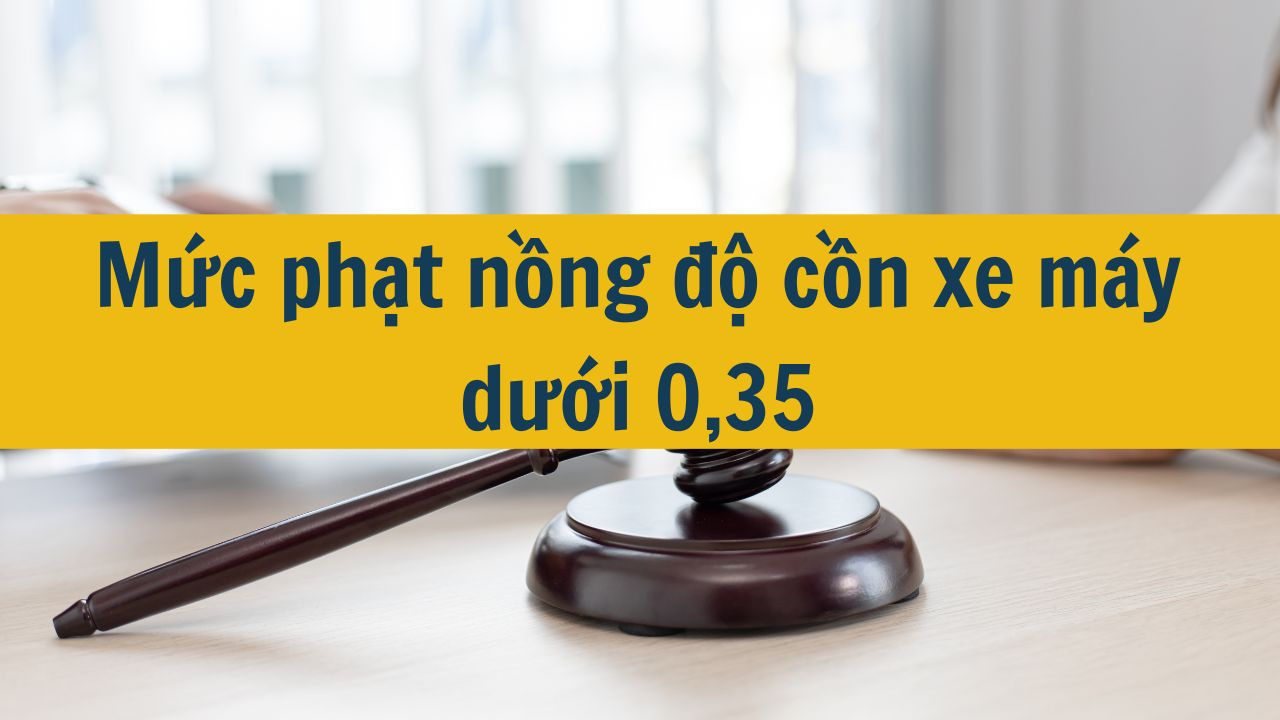
Mức phạt nồng độ cồn xe máy dưới 0,35 mới nhất 2025
Mức phạt nồng độ cồn xe máy dưới 0,35 đang là vấn đề được nhiều người quan tâm trong việc thực thi pháp luật giao thông. Việc hiểu rõ quy định về nồng độ cồn và mức phạt không chỉ giúp người tham gia giao thông tuân thủ đúng luật mà còn tránh các hậu quả pháp lý nghiêm trọng. Cùng tìm hiểu chi tiết về mức phạt này trong bài viết dưới đây 21/01/2025Mức phạt nồng độ cồn xe máy dưới 0,1 mới nhất 2025?
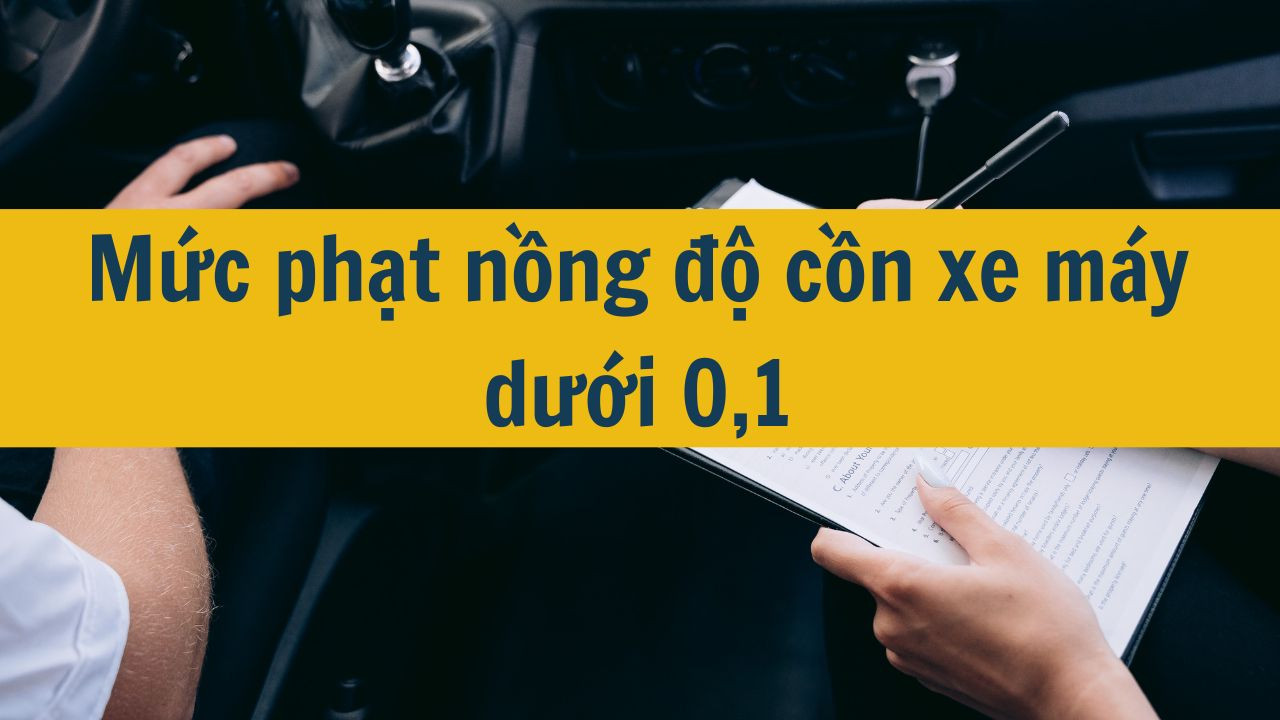
Mức phạt nồng độ cồn xe máy dưới 0,1 mới nhất 2025?
Hiểu rõ mức phạt nồng độ cồn khi lái xe máy là điều cần thiết để bảo vệ bản thân và tuân thủ pháp luật. Vậy nồng độ cồn dưới 0,1 mg/l khí thở có bị xử phạt không? Bài viết dưới đây sẽ cập nhật chi tiết quy định mới nhất và các mức phạt cụ thể theo luật giao thông đường bộ hiện hành. 21/01/2025Nồng độ cồn 0.75 phạt bao nhiêu tiền mới nhất 2025?
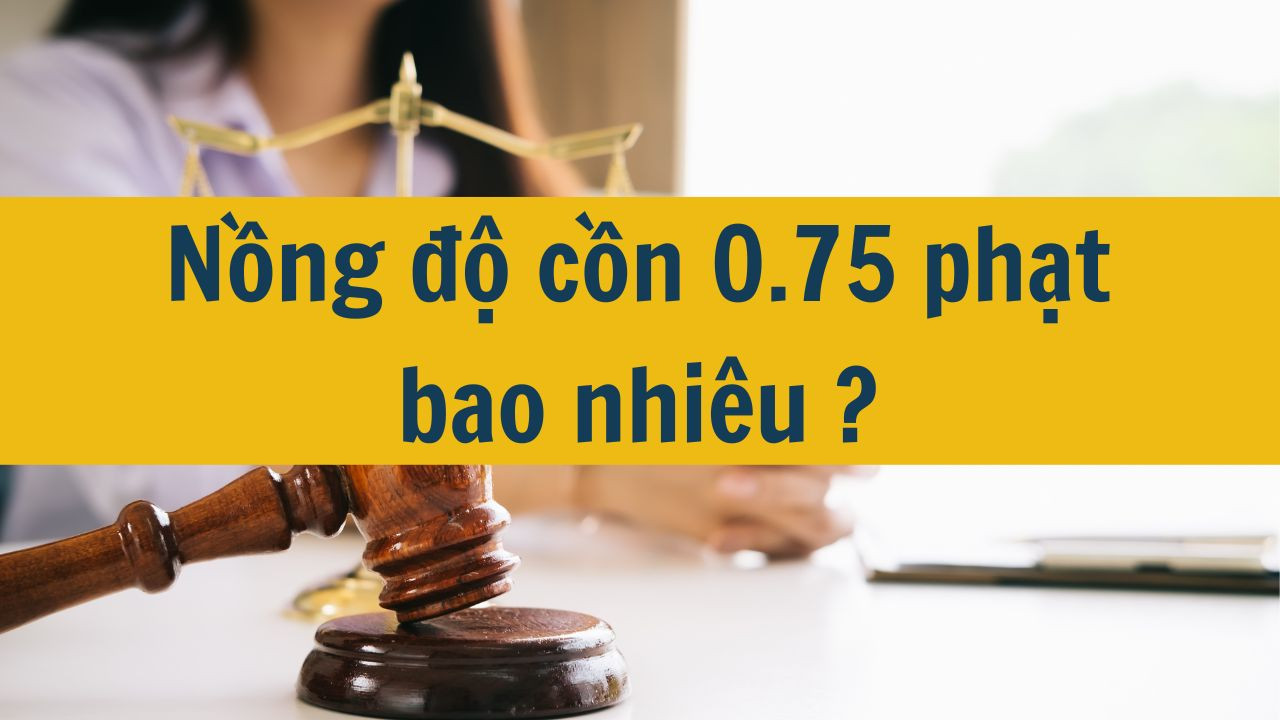
Nồng độ cồn 0.75 phạt bao nhiêu tiền mới nhất 2025?
Việc điều khiển phương tiện giao thông khi nồng độ cồn vượt ngưỡng cho phép không chỉ tiềm ẩn nguy hiểm mà còn vi phạm pháp luật. Vậy nồng độ cồn 0.75 mg/l khí thở sẽ bị xử phạt như thế nào? Cùng tìm hiểu mức phạt chi tiết, quy định hiện hành và những hậu quả pháp lý mà người vi phạm phải đối mặt trong bài viết dưới đây. 21/01/2025Nồng độ cồn 0.251 phạt bao nhiêu mới nhất 2025?
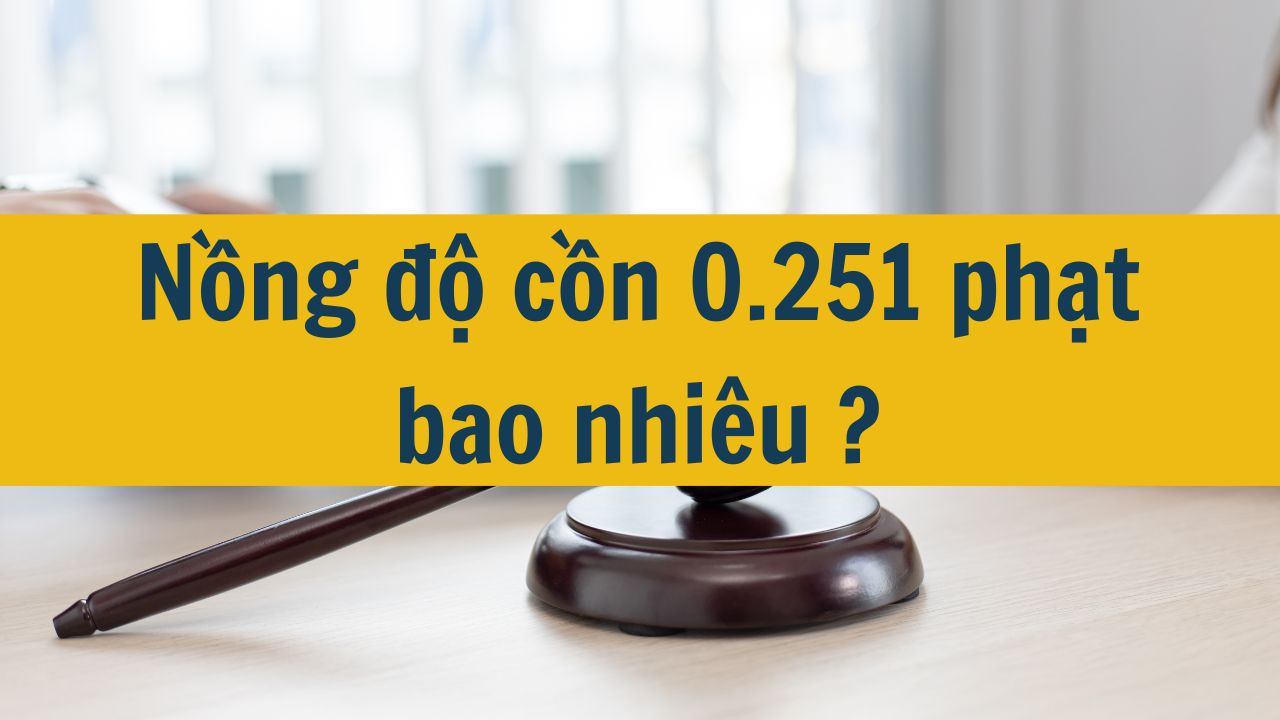
Nồng độ cồn 0.251 phạt bao nhiêu mới nhất 2025?
Vi phạm nồng độ cồn khi tham gia giao thông là hành vi nguy hiểm, tiềm ẩn nhiều rủi ro. Mức phạt cho nồng độ cồn 0.251 mg/l được quy định rõ trong Nghị định 168/2024/NĐ-CP và các văn bản sửa đổi. Bài viết dưới đây sẽ cung cấp chi tiết về mức phạt hành chính, hình thức xử phạt bổ sung và những lưu ý quan trọng bạn cần biết. 21/01/2025Chạy xe máy mà có nồng độ cồn có phải là hành vi bị nghiêm cấm mới nhất 2025?

Chạy xe máy mà có nồng độ cồn có phải là hành vi bị nghiêm cấm mới nhất 2025?
Việc điều khiển xe máy khi trong máu hoặc hơi thở có nồng độ cồn là vấn đề pháp lý nhận được sự quan tâm lớn từ cộng đồng. Hành vi này không chỉ tiềm ẩn nguy cơ gây tai nạn giao thông mà còn vi phạm quy định pháp luật hiện hành. Vậy pháp luật Việt Nam quy định như thế nào về hành vi này? Hãy cùng tìm hiểu chi tiết trong bài viết dưới đây! 21/01/2025Đo nồng độ cồn 0.45mg/lít khí thở khi lái xe máy thì sẽ bị xử phạt bao nhiêu tiền? Có bị giam xe máy hay tước bằng lái xe không mới nhất 2025?
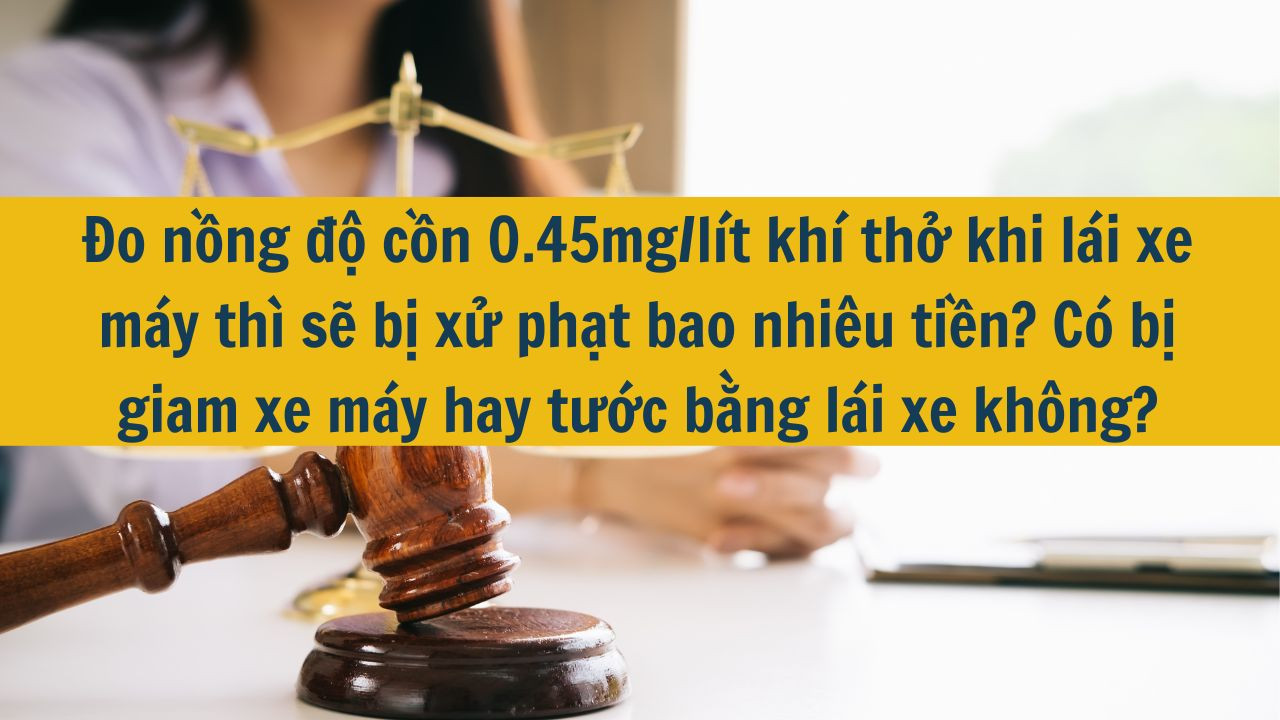
Đo nồng độ cồn 0.45mg/lít khí thở khi lái xe máy thì sẽ bị xử phạt bao nhiêu tiền? Có bị giam xe máy hay tước bằng lái xe không mới nhất 2025?
Nồng độ cồn 0.45mg/lít khí thở là mức vi phạm nghiêm trọng khi điều khiển xe máy. Vậy người vi phạm sẽ bị xử phạt bao nhiêu tiền? Có bị tạm giữ phương tiện hay tước giấy phép lái xe không? Hãy cùng tìm hiểu chi tiết trong bài viết dưới đây để nắm rõ quy định pháp luật và tránh những hậu quả đáng tiếc! 21/01/2025Nồng độ cồn 0.227 phạt bao nhiêu mới nhất 2025?
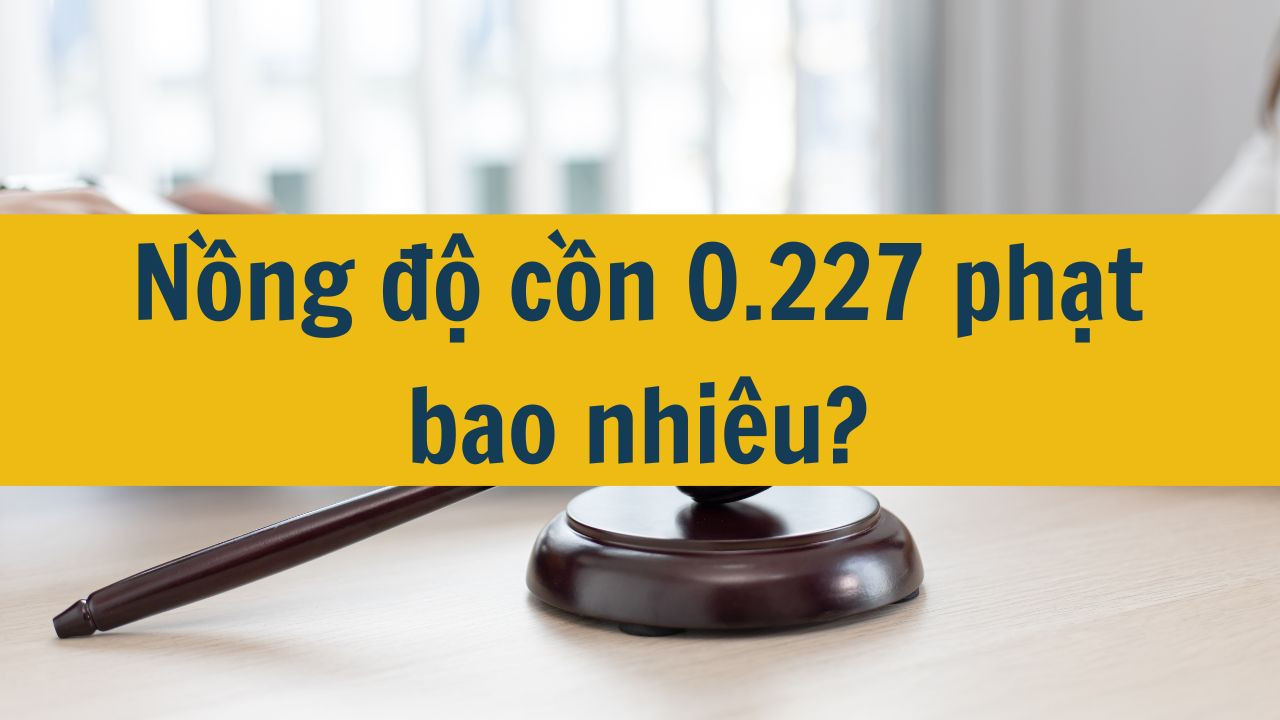
Nồng độ cồn 0.227 phạt bao nhiêu mới nhất 2025?
Việc điều khiển phương tiện khi có nồng độ cồn vượt mức cho phép không chỉ gây nguy hiểm mà còn chịu mức phạt nặng theo quy định pháp luật Việt Nam. Vậy mức phạt cụ thể cho nồng độ cồn 0.227 mg/lít khí thở là bao nhiêu? Hãy cùng tìm hiểu chi tiết trong bài viết dưới đây để tránh vi phạm và bảo vệ an toàn cho bản thân cũng như cộng đồng! 21/01/2025Từ chối đo nồng độ cồn, có bị phạt không mới nhất 2025?
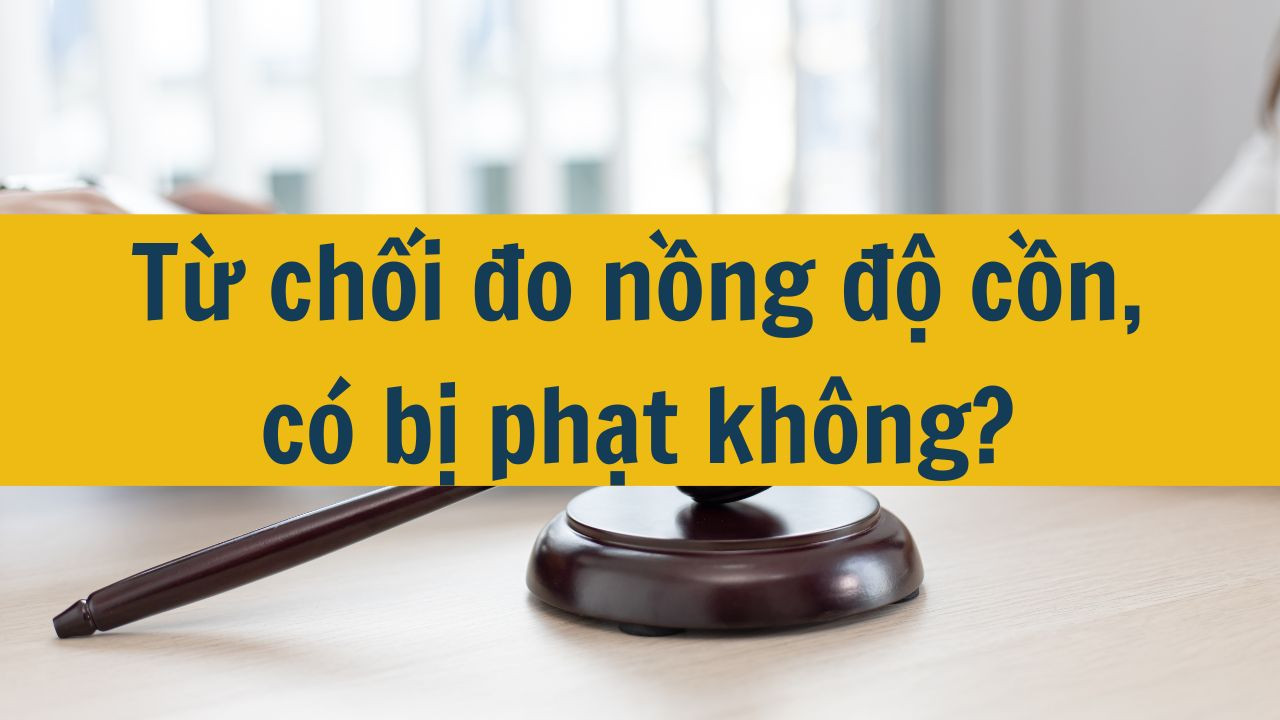
Từ chối đo nồng độ cồn, có bị phạt không mới nhất 2025?
Việc kiểm tra nồng độ cồn khi tham gia giao thông là quy định bắt buộc nhằm đảm bảo an toàn cho tất cả mọi người. Tuy nhiên, không ít trường hợp tài xế từ chối hợp tác với lực lượng chức năng. Vậy hành vi này có bị xử phạt không? Mức phạt cụ thể như thế nào? Hãy cùng tìm hiểu chi tiết trong bài viết dưới đây! 21/01/2025Nồng độ cồn xe máy dưới 0,25 có bị tước bằng lái, giam giữ xe không mới nhất 2025?
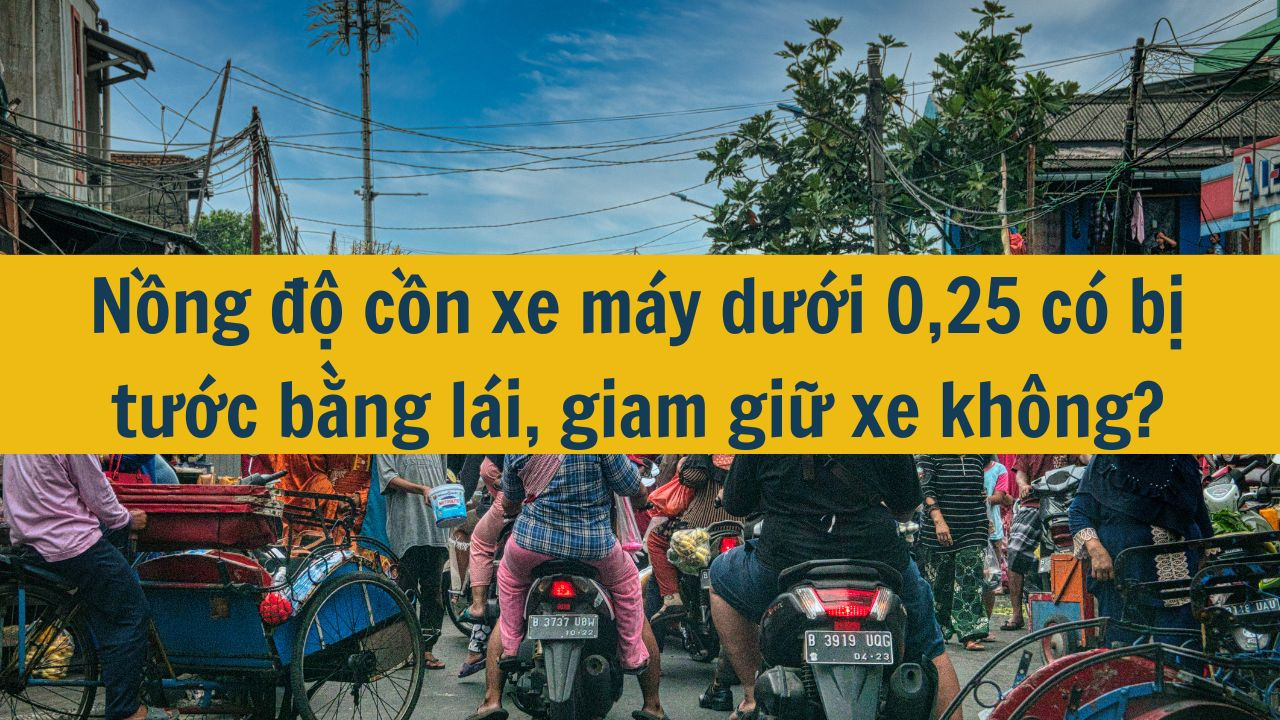
Nồng độ cồn xe máy dưới 0,25 có bị tước bằng lái, giam giữ xe không mới nhất 2025?
Nồng độ cồn xe máy dưới 0,25 mg/lít khí thở có bị tước bằng lái, giam xe không? Đây là câu hỏi được nhiều người quan tâm khi tham gia giao thông sau khi uống rượu bia. Bài viết này sẽ cung cấp thông tin chi tiết về mức xử phạt theo quy định mới nhất của pháp luật Việt Nam, giúp bạn nắm rõ quyền và nghĩa vụ của mình khi điều khiển xe máy trong tình trạng có nồng độ cồn. 21/01/2025Nồng độ cồn xe máy dưới 0,25 có bị phạt không? Mức phạt bao nhiêu mới nhất 2025?
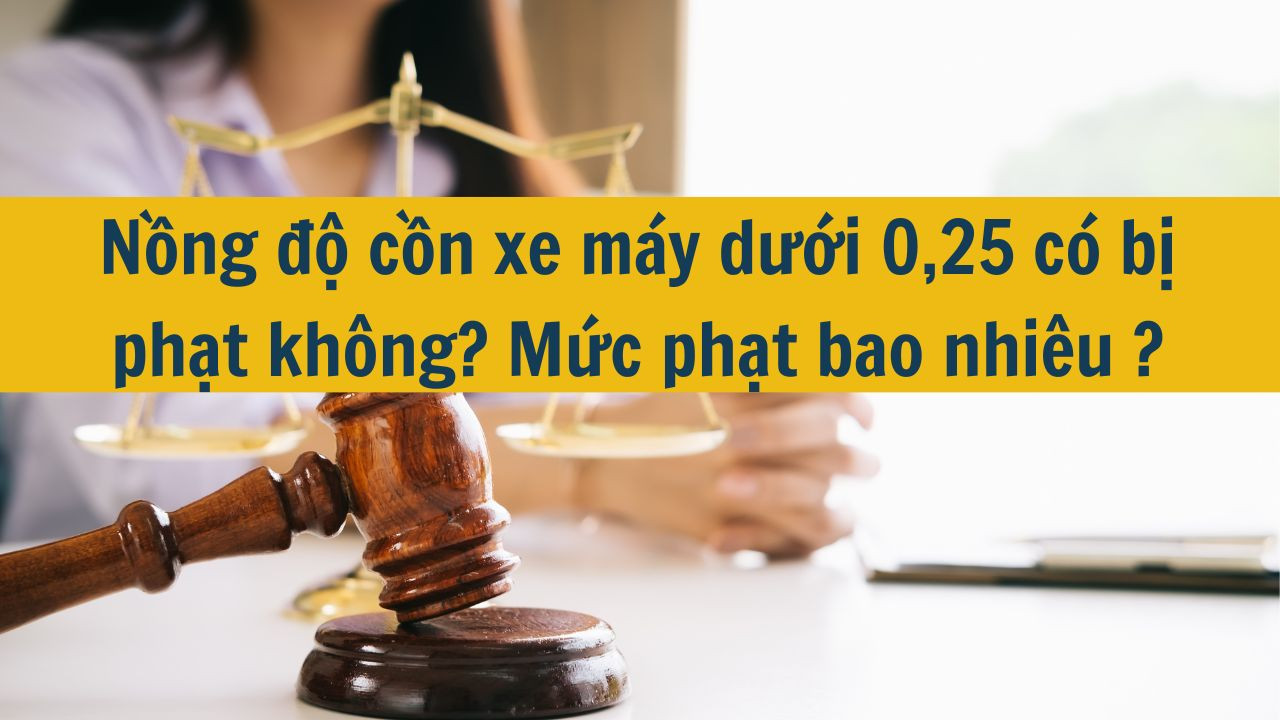

 Luật xử lý vi phạm hành chính 2012 (Bản Word)
Luật xử lý vi phạm hành chính 2012 (Bản Word)
 Luật xử lý vi phạm hành chính 2012 (Bản Pdf)
Luật xử lý vi phạm hành chính 2012 (Bản Pdf)